Reality: China has not engaged in pro-market reform since 2005 and has only talked about rebalancing.
Chinese GDP figures released on July 15 beat expectations, with growth reaching 7.5 percent year over year in the second quarter of 2014. Economists expected 7.4 percent. Most people believe China will overtake the United States as the world’s most powerful economy if this growth continues. Not so fast, say Dean Cheng and Derek Scissors of the Heritage Foundation.
For those not paying close attention, China seems to have stayed on the path of economic reform for the past two decades, with perhaps an understandable and wise (in many eyes) exception for government intervention during the financial crisis. More recently, the Chinese government has publicly committed to making consumption the core of the economy.
In fact, the last decade of Chinese economic policy can be broken into three parts. First, roll back the market in favor of the state without anyone noticing. Then roll back the market in favor of the state to global cheers. Conclude by worrying about the harm done by rolling back the market in favor of the state. Beijing presently talks about de-emphasizing investment and promoting consumption but has been unable or unwilling to act.
China’s imbalance problem did not always exist, it was created in 2003, when investment growth accelerated. Sustaining this acceleration required investment vehicles, which meant the state had to exert tight control over banks and major corporations. This control was highlighted in 2009, when China ordered state banks to greatly expand lending even while the business environment was deteriorating. Now this defiance of commercial logic is coming home to roost in the form of sharp concerns about debt.
Rebalancing has not even begun. From 2002 to 2012, fixed investment expanded by a factor of 11 while retail sales, a consumption measure, expanded by a factor of 5. By the end of 2012, fixed investment was three-quarters again as large as retail sales. In the first half of 2013, investment grew another 20 percent and retail sales grew 12 percent.
The broader reform picture is no better. Beijing does not like competition in the home market (competition in other markets, of course, is a marvelous idea). For coal, gas, oil and petrochemicals, power, telecoms and tobacco, there are a total of 17 enterprises operating nationally, all extremely large and all state-owned. An anti-monopoly law is not applied to these firms but is brandished against foreign companies. The government wants other industries to also consolidate on a few large state firms.
China is a large and important economic partner for the United States, but it has stopped reforming and is not a very good partner.
This is Part 2 of an abridged three-part series originally published at heritage.org.


